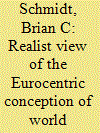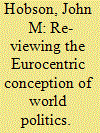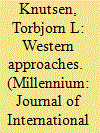| Srl | Item |
| 1 |
ID:
133556


|
|
|
|
|
| Publication |
2014.
|
| Summary/Abstract |
This article provides a critical review of John Hobson's The Eurocentric Conception of World Politics. More specifically, it challenges Hobson's interpretation of realism and it questions the extent to which he accuses earlier thinkers of being racists
|
|
|
|
|
|
|
|
|
|
|
|
|
|
|
|
| 2 |
ID:
133559


|
|
|
|
|
| Publication |
2014.
|
| Summary/Abstract |
This article responds to the five forum pieces that critically engage my 2012 book The Eurocentric Conception of World Politics, the central argument of which is that ever since 1760 international theory has not provided ideologically neutral, universalist explanations of world politics but has been charged, or even mandated, with the provincial objective of defending, promoting or celebrating Western civilization as the highest referent of the world. The first section defends the book's claim that pre-1945 realism was founded largely on various scientific racist bases (specifically between 1889 and 1945) - what I call 'racist realism' - while the second section defends my claim that classical realism and neorealism are not culturally neutral, universal approaches but are grounded in an underlying Western provincialism. The third section defends my reading of three pioneering figures of IR, John Burgess, Paul Reinsch and J.A. Hobson, while the fourth section reframes my non-Eurocentric reading of international theory in the last 250 years through a gendered lens so as to flesh out how gender/patriarchy and racism/Eurocentric institutionalism are mutually embedded, polymorphous discourses. Finally, the conclusion tackles the dual criticism that the book is limited by its Anglo-centric focus, on the one hand, and its situation within a critical tradition that is inherently European, if not Eurocentric, on the other
|
|
|
|
|
|
|
|
|
|
|
|
|
|
|
|
| 3 |
ID:
133554


|
|
|
|
|
| Publication |
2014.
|
| Summary/Abstract |
The Eurocentric Conception of World Politics is a fabulous but depressing genealogy of the modern study of International Relations (IR). The book is impressively comprehensive in content, It is complex in design. It exposes the self-serving dogmatism which have always marked mainstream IR literature. While admiring the scholarly qualities of the book, this review wonders if its critical exposure is excessive? Is there any scholarly approach in IR which is not crippled by its comprehensive condemnation? Does this book, which is written in the European tradition of Critical Theory, ultimately become a victim of its own sweeping criticism of the Western canon?
|
|
|
|
|
|
|
|
|
|
|
|
|
|
|
|